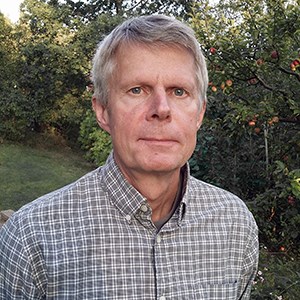Contact
njfak@slu.se, +46 18 67 10 00

All the best for 2020: The International Year of Plant Health
The UN wants to draw attention to the importance of healthy plants (and plant protection) for the well-being of mankind and the earth. Here, SLU has unique expertise in solving present and future challenges not the least by postgraduate education.
The future supply of competence in academia, business, community functions and other fields of importance requires academia to succeed in "producing" doctors. These graduates should have the capacity of free and creative thought and in a system perspective where multidisciplinary and interdisciplinary approaches are becoming increasingly important.
Does SLU manage this? Absolutely, but we must be ready to adapt and, as plants, exhibit plasticity to a changing environment while maintaining high quality in research and education. Visibility is increasingly important where SLU should be an obvious habitat for the ambitious postgraduate. In addition to mastering the necessary scientific prose doctoral students should be encouraged to develop their popular science writing to arouse interest about SLU. The ability to simplify and clarify can also enhance applications by conveying the message easily and effectively. Communicators stand by to support where needed.
UKÄ (the Swedish Higher Education Authority) evaluates the quality of postgraduate education from the perspective of adherence to regulations. This year, the doctoral education subject Chemistry is under evaluation. In addition to the formalities, it is of course important that the doctoral students become satisfied with their education and enjoy a healthy and creative environment. Studies such as "The doctoral student mirror", "How is the doctoral student doing?" and "Graduate survey: A love-hurt relationship" show that many students experience stress for various reasons.
Completely avoiding stress in postgraduate education is a utopia, but we must keep the discussion going and clarify rights-obligations in postgraduate education. Important components are supervision and psychosocial work environment. Clear roles and commitments as well as discussions about expectations and goals based on given resources facilitate for all parties. Continuity in supervision and feedback can improve stress management and make the doctoral student to grow in her/his role. Most doctoral students are satisfied, but the conditions can be improved. A doctoral student is like a plant - with good environment and nourishment, they thrive and give a high return avoiding a bad harvest.
External collaboration - the third task - also includes postgraduate education and LivsID is an example of this. Within the framework of the national food strategy, the NJ faculty is responsible for a program of ten industrial doctoral students in the field of food science (LivsID). An excellent example of how basic research can be linked to innovations and product development in collaboration with the industry. Other doctoral programs should also be possible to launch, but this is based on long-term planning. Proactive strategies benefit SLU's visibility in various forums where several researchers talk together to take initiative on program proposals that can be targeted at different actors. Plant Health may serve as a starting point!
Digitization is an ever developing process and new media are being discussed within postgraduate education. Ideas circulating include e.g. Youtube as part of a compilation dissertation, that the dissertation is only published on the web or papers submitted as open (pre-) publication where the readers' comments constitute a kind of quality review. Other challenges are increased demands on open access publishing and its additional costs as well as the quality of various journals. Now there are central agreements with some publishers that cover open access costs. In recent years, however, journals have appeared where an unknown, substandard or non-existent quality review exists despite charges of publishing. The postgraduate education committee awaits the "Swedish list" (cf. "The Norwegian list") with the intention of giving recommendations on where to publish. Classic journals with a high impact factor will probably still have high confidence (and charge for it).
Since its peak, the proportion of the population that starts postgraduate education has halved, while the number of foreign doctoral students has increased. This tendency has initiated discussion of future competence provision. Good postgraduate education conditions including intercultural aspects increases the likelihood that the PhDs will choose to continue their career later at SLU or collaborate. Increased diversity creates more dynamics and networking that favors "scientific health" and e.g. "Plant health" – a win-win situation for SLU and the earth!
/Johan Meijer
Vice Dean responsible for doctoral education
njfak@slu.se, +46 18 67 10 00